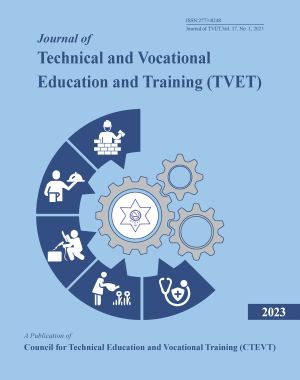Approaching Apprenticeship in Nepal: Lessons from Dual-VET of Germany
DOI:
https://doi.org/10.3126/tvet.v17i1.52405Keywords:
informal apprenticeship, apprenticeship in the dual VET system, Nepal, GermanyAbstract
Apprenticeship training is geared towards meeting the demands of labor market which also ensures self-esteem, employability and vocational career development for the individuals. Against this background, apprenticeship is seen as a successful model for grooming the labor force and reducing youth unemployment. In this paper, we map the current state-of-the-art of apprenticeship in Nepal against the dual system of VET in Germany. The central question in our reflection is how common ownership can be established through responsibility sharing in countries, where other governance principles apply and the governance models also differ from the German model. Hence, in the first step, we focus on the origins of vocational training in both countries. We show that the development of apprenticeship has been driven by social, political and industrial needs, thereby getting deeply rooted in society. We show that despite many challenges, dual training in Germany is an important educational pathway for young people to access the labor market and a backbone of the economy. This is different in Nepal, where despite the governance structures that have been created in the meantime, apprenticeship training is struggling for recognition among the leaders, and actors in the economy. We end up adopting the "six central pillars for successful quality apprenticeships" (i.e. meaningful social dialogue, robust regulatory framework, clear roles and responsibilities, equitable funding, strong labor market and inclusiveness) developed by the ILO (2017). We reflect on them with reference to the Nepali case and in the shadow of the German experiences. In our conclusion, we propose to add "consideration of the country context" as the seventh important pillar for qualitative apprenticeship to ensure sustainable development – free of external funding and support.
Downloads
Downloads
Published
How to Cite
Issue
Section
License
© CTEVT All rights reserved
CC BY-NC This license enables reusers to distribute, remix, adapt, and build upon the material in any medium or format for noncommercial purposes only, and only so long as attribution is given to the creator.




